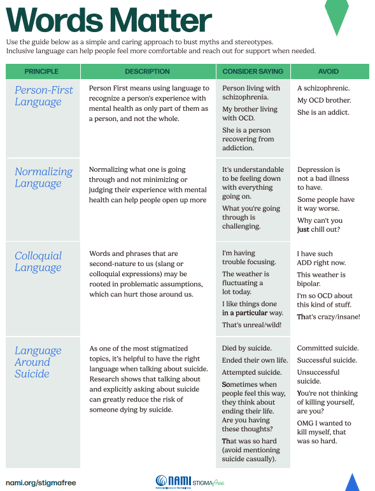Take it seriously. Mental illness is a very real struggle.
1-in-5 adults in the U.S. experience mental illness each year.
1-in-20 experience severe mental illness each year.
1-in-6 youth aged 6-17 experience mental illness each year.
Suicide is the 2nd leading cause of death among people aged 10-14.
Think about it from this angle: how many people do you know? How many people do you encounter on a weekly basis? Now look at those numbers again. How many people in your life might be struggling with mental illness? We cannot allow ourselves to easily brush off the stats when Jesus said, "The second [greatest commandment] is this: ‘Love your neighbor as yourself'" (Mk.12:31).
Learn about mental illness. Read about mental illness from mental health professionals. An excellent place to begin is the National Alliance on Mental Illness (That's where the stats above are from). Also, see the Resources Tab on this website for more learning resources.
If you are a church leader, normalize mental illness in the church. Talk about it in your sermons and Bible studies. Provide resources from mental health professionals to the people in your church.
Don’t stigmatize. Stigmas are negative views about people or circumstances that create shame or disgrace. In the church, it might look like this: “You just don’t have enough faith” or looking down on someone as an immature Christian because they struggle with mental illness. Even though you might never speak them, these bad attitudes are often communicated through facial expressions, body language, tone of voice, and exclusion.
Don’t judge. It’s always tempting to look down on people who are struggling in areas where you appear to be strong. Oftentimes, when people struggle with mental illness, the thought creeps into our minds: “They can’t handle life like me.” Mental illness is much more than being able to “do life.” Everyone experiences stress in life—work, family, finances, health, relationships, and so on. That’s a given. But not everyone starts from the same place (childhood trauma, genetics, and environment) and not everyone experiences the same level of stress (traumatic events, number of events, when they occur, how close together) and not everyone has the same resources for help during those periods of stress (support, family, professional help, medicine, insurance). It’s wrong to think that if you merely handled stress “better,” a mental crisis would be avoided. Life throws curve balls at us all the time.
Pastors and leaders: know when and who to refer to. Gain a basic understanding of mental illness symptoms so you’ll know them when you see them. Do a search for mental health professionals in your area and put together a list of people and places to refer. Better still, develop relationships with local mental health service providers to help direct church members to services and support in the community. Give them a call or set up a meeting in-person or by Zoom. It might be a relationship that could change someone’s life.
Refuse to slap a verse on the issue. Refuse to minimize someone’s struggle by simply quoting Scripture. Someone with severe anxiety disorder isn’t helped by sending them a text that reads, “Be anxious for nothing.” That’s the equivalent of reminding a prodigal’s parents, “The Bible says, ‘Train up a child in the way they should go; when they are old they won’t depart from it.’” Refusing to “read the room” will result in guilt and shame in the person you genuinely care about. They won’t receive what you’re saying the way you think (see 1 Cor.13:1).
Hold space for them to struggle with mental illness. Don’t argue with them about reality or try to correct what they say. Listen with compassion and understand that this is how they see the world right now.
Recognize that someone struggling with mental illness is a person. They are a son, daughter, mother, or father. They have a life that cannot be defined by their current struggle. They are more than their diagnosis.
Check in with their family members. At least 8.4 million people in the US provide care to someone struggling with mental illness. On average, these caregivers spend about 32 unpaid hours per week caring for their loved ones—usually in addition to holding down a full-time job. They are on the edge of a mental crisis of their own. Acknowledge their needs. Ask how they are doing. Offer to run errands, do chores, go to the grocery store, watch their kids, or other things that will ease their load.
10 Ways to Help Persons Struggling with Mental Illness
Related:



